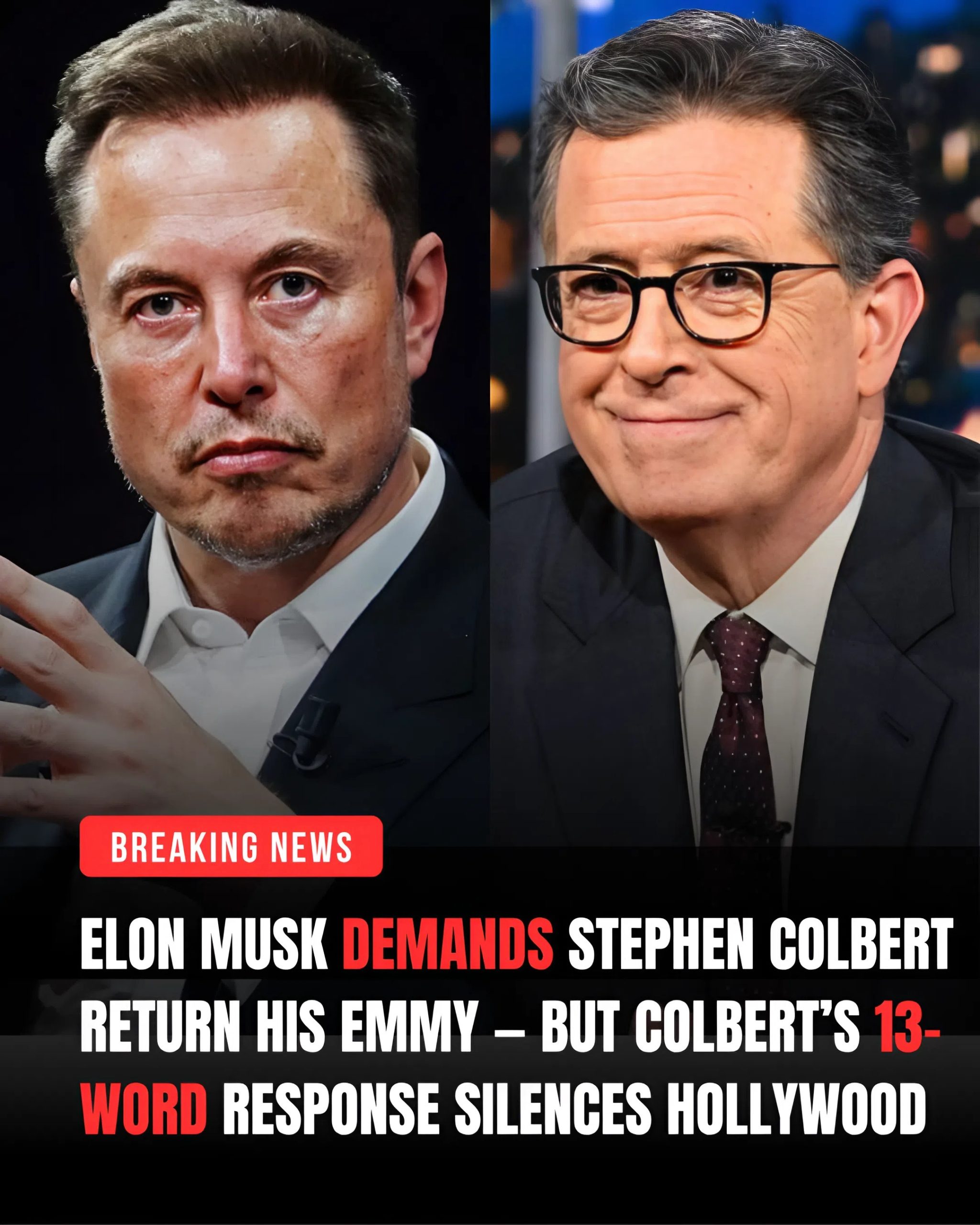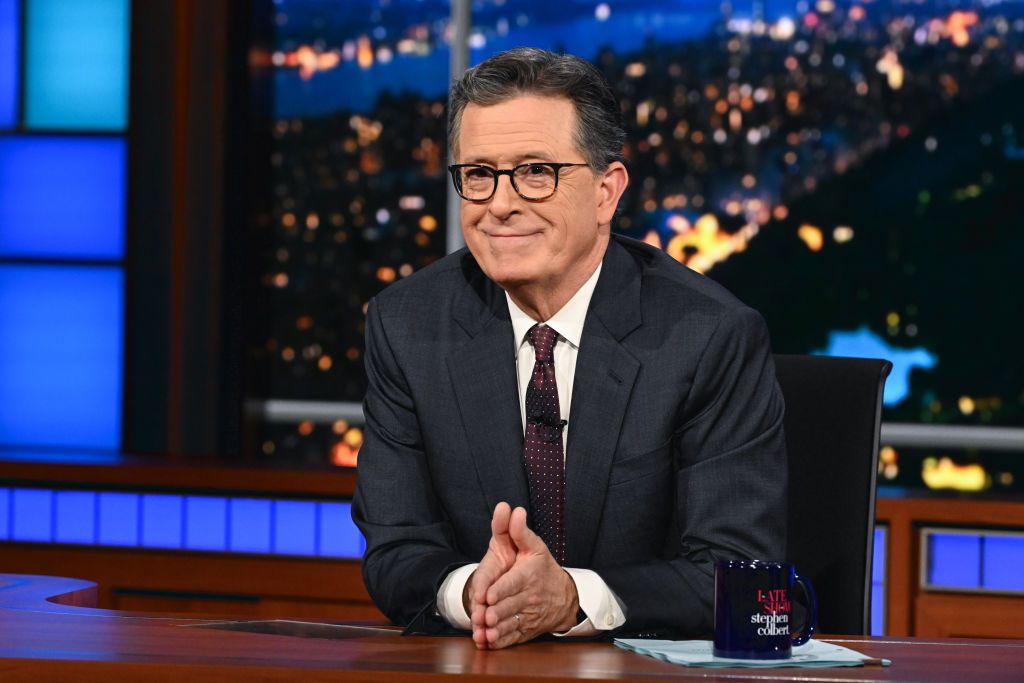It began with a tweet, vanished within minutes, and ignited one of the strangest cultural showdowns Hollywood had seen in years.
At 9:47 p.m. on a Sunday, Elon Musk — billionaire engineer, provocateur, and self-proclaimed “meme lord” — posted a blunt message to his 180 million followers:
“Stephen Colbert should return his Emmy. Jokes are one thing — defamation is another.”
Within seconds, screenshots spread faster than the original post.
What joke? Which Emmy? And why now?

The Trigger
Earlier that week, The Late Show had aired a satirical sketch titled “Mission: Marsed-Up” — a parody of Musk’s ambitious space ventures.
Colbert, dressed in a silver jumpsuit, played “Elon Husk,” a billionaire who launches a rocket made entirely of ego and taxpayer money. The fake rocket explodes on cue, showering the set with confetti.
Audience laughter was thunderous.
Musk, it turns out, was watching.
According to insiders at X (formerly Twitter), the real Musk initially laughed. But after the clip went viral and investors began tagging him with memes about “ego rockets,” the tone changed.
By Sunday, he’d had enough.
Hollywood Reacts
By Monday morning, #ReturnTheEmmy trended across social media — half mocking Musk, half cheering him on.
Publicists scrambled. Talk shows sharpened their monologues.
For a moment, the entertainment world seemed to orbit around a single question:
Can power take a joke?
Industry analyst Mara Fein put it simply:
“This wasn’t about an award. It was about control. Who gets to shape the narrative — the billionaire, or the comedian?”
Colbert’s Silence… Then His Thirteen Words
When The Late Show opened that night, the studio audience buzzed with anticipation.
Would Colbert address Musk’s demand?
Would he apologize? Double down?
For the first ten minutes, he said nothing.
Then, after a commercial break, he walked to the edge of the stage, looked into the camera, and said:
“Elon, I’d return the Emmy — but it’s already in orbit around your ego.”
Thirteen words.
The audience erupted.
The clip hit 30 million views overnight.
And just like that, the balance of the feud shifted.

Behind the Scenes
Sources close to both camps describe a strange blend of admiration and irritation between the two men.
Colbert has long admired technological innovation; Musk has called comedy “the last real test of free speech.”
But both are territorial about their public image — and both understand performance better than almost anyone else alive.
Media scholar Dr. Rina Valdez notes:
“They’re mirror images. Colbert performs humility through satire; Musk performs sincerity through spectacle. When those performances clash, it’s cultural theater.”
Indeed, the so-called “Emmy War” became less about awards and more about what each figure represents — the comedian as truth-teller, the tech mogul as modern king.
The Aftermath
The morning after Colbert’s jab, Musk responded with a single emoji — a winking face and a rocket.
Then silence.
No follow-up, no threats, no explanations.
In Hollywood terms, that meant the war was over.
But in cultural terms, it had already made its mark.
Clips from both the parody and Colbert’s comeback dominated feeds for days.
Marketing analysts estimated that The Late Show gained 1.2 million new subscribers on YouTube within 48 hours.
Meanwhile, Musk’s companies saw a measurable spike in social mentions — mostly humorous, occasionally hostile.
As one insider at Tesla quipped,
“Only Elon could turn a PR nightmare into a marketing campaign.”
The Anatomy of a Feud
At its core, the Musk-Colbert clash was the perfect storm of 21st-century celebrity.
No violence, no scandal — just words, platforms, and influence.
Musk weaponized seriousness; Colbert countered with humor.
Each understood that in the attention economy, the first to laugh wins.
The public, for its part, seemed to love both.
One poll by Variety found 46% of respondents sided with Colbert, 38% with Musk, and the rest said simply, “It was great television.”
Comedy and Consequence
The episode reignited debate over satire’s place in a polarized culture.
Was Colbert punching up — or crossing a line?
Did Musk overreact — or draw necessary boundaries?
Comedian W. Kamau Bell weighed in:
“You can’t launch flamethrowers and Mars rockets, then demand people not make jokes. That’s not how celebrity works anymore.”
Meanwhile, some media ethicists argued that late-night comedy’s influence has grown so vast that it now shapes real-world reputations as much as journalism does.
When humor becomes commentary, they warned, it carries responsibility.
Colbert, for his part, seemed unfazed.
During a later interview, he reflected:
“Comedy’s job isn’t to be comfortable. It’s to reveal the uncomfortable — with a smile.”
Power and Parody
The feud, brief as it was, exposed something deeper about modern fame.
In an era where billionaires tweet like stand-up comics and comedians influence political discourse, the line between authority and entertainment is blurrier than ever.
Musk, whose ventures stretch from EVs to AI to Mars, embodies the myth of the visionary disruptor.
Colbert, heir to America’s satirical conscience, represents the skeptic — the cultural immune system that challenges unchecked ambition.
Their clash wasn’t about an Emmy; it was about the symbolic tug-of-war between those who make the future and those who question it.
The Final Word
A week later, Musk posted again — this time a photo of a rocket-shaped trophy captioned, “My new Emmy.”
Colbert replied within the hour: “Careful — it might explode.”
The internet collectively exhaled, half-laughing, half-relieved.
No lawsuits. No cancellations. Just two men — both masters of the spotlight — playing their roles to perfection.
As entertainment critic Alison Choi summarized:
“In a world addicted to outrage, they gave us something better — a reminder that ego and humor can coexist, if only for a punchline.”
The dust settled. The memes faded.
But for a brief, electric week, the question lingered:
Who won?
Maybe neither.
Or maybe both — because in Hollywood’s grand orbit, attention is the only trophy that never needs returning.